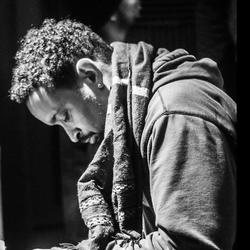Michael Demps

Michael Demps’ practice is fueled by a fascination with the nature of being—being in one’s body and more specifically, the social structures that confine the body’s ability to move through the world. It is important to understand that such experiences are different in different bodies in order to develop more empathetic relationships with one another, and celebrate more complex and nuanced ways of being. As an artist, Demps is dedicated to exploring notions of the Black interior through making. This interest permeates his collaborative and non-collaborative projects. During the past year he has had the opportunity to exhibit work that contends with the mapping of an interior interconnectivity to the collective through the personal and through somatic activation. His work ranges from abstract monoprint image generation and ghost printing to creating objects that serve as spiritual markings put forth to hold space for self-discovery, recovery and recuperation. These generative systems of making through recontextualization, improvisation and repetition serve as grounding values of his practice and exist in a fugitive space against authorship as a gatekeeper of racism and capitalism. The current cultural shift due to the pandemic has left Demps searching for ways to move his practice forward and engage with audiences in new ways.
Courses
Fall 2024 Courses
FOUND 1005-25
STUDIO: SPATIAL DYNAMICS
SECTION DESCRIPTION
Studio: Spatial Dynamics is a studio-based inquiry into physical, spatial and temporal phenomena. The study of Spatial Dynamics is rooted in the necessity to consider forces and their effects on structure. Force is the consequence of energy. In Spatial Dynamics the energy and resultant forces are studied in actual motion, stability, and materiality. The structures of physical, spatial and temporal phenomena are studied through additive, subtractive, transformative, iterative, and ephemeral processes both analog and digital. Mediums and materials that are commonly explored and utilized have a broad range of characteristics due to their organic and synthetic sources. Most assignments utilize methods such as preliminary sketches and diagrams in research, planning, and experimental processes. Assignments reference the histories and theories of art and design and include areas of inquiry that extend to disciplines such as the sciences, music, dance, film, and theater.
Enrollment is limited to First-Year Undergraduate Students.
Major Requirement | BFA
SOUND 2002-01
SONIC MAPPING: NARRATIVES, SOUNDSCAPES AND ARCHIVES
SECTION DESCRIPTION
The "Sonic Mapping: Narratives, Soundscapes, and Archives" course is an educational journey into the fusion of soundscapes, location, and narrative creation. It offers an in-depth exploration into the process of gathering field recordings, developing a thematic sound collection, and leveraging this collection as a cornerstone for storytelling and musical creation. Centered around the concept of "Sonic Mapping of Locations," this course challenges students to engage in active listening, effective recording, and imaginative composing, transforming fleeting sounds from varied environments into engaging auditory narratives and sonic compositions. Students will need a laptop computer (Mac or Windows). Previous experience with digital audio software recommended.
Elective